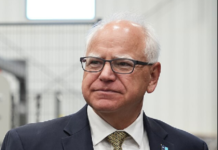Rep. Alexandria Ocasio-Cortez (D-NY), a prominent Democrat, is preparing to introduce an updated edition of her “Green New Deal” that aims to promote global cooperation and finance social initiatives using American taxpayer funds. The revised “Green New Deal” proposed by AOC includes the elimination of all gas stoves in public housing as part of efforts to combat climate change, among other measures.
Additionally, the plan advocates for the funding of socialist programs such as the establishment of universal healthcare and guaranteed income initiatives.
When AOC initially unveiled her Green New Deal in 2019, socialism was a central theme. Her plan at the time proposed guaranteed income programs that would provide individuals with a taxpayer-funded wage, even if they were capable of working but chose not to.
The new version of the plan seems to retain these socialist initiatives while incorporating new elements to advance the globalist green agenda. According to Politico, AOC, along with Sen. Bernie Sanders (I-VT) and other progressive lawmakers, introduced the “Green New Deal for Public Housing Act” in Washington, D.C. on Thursday.
The proposed bill is designed to create economic empowerment opportunities within the United States through the implementation of environmentally-friendly practices in public housing, as outlined in the document.
The bill is designed to “reimagine and reinvigorate public housing in the United States” and reverse “many of the environmental injustices that public housing residents have faced,” AOC told Politico. According to the Department of Housing and Urban Development, around 1.2 million American households reside in public housing.
The proposed legislation mandates the replacement of appliances that rely on fossil fuels with electric appliances in public housing across the United States. Additionally, the bill requires the development of electric vehicle charging infrastructure for both residents and visitors of public housing, as stated in the bill’s language.
Electric vehicles generally come with a higher price tag compared to gas-powered vehicles, with the average electric vehicle costing consumers approximately 25% more than the average traditional automobile, according to Green Cars. It remains unclear why AOC and her supporters assume that individuals living in public housing would be able to afford expensive electric vehicles.
In the past, Ocasio-Cortez and other progressive lawmakers have made unsuccessful attempts to pass Green New Deal legislation in both 2019 and 2021. Both of these attempts failed due to the extensive and costly nature of the proposed legislation.
The original version of the Green New Deal included a variety of progressive proposals, such as transitioning the American economy away from fossil fuels within a decade and phasing out cattle farming. Furthermore, it advocated for socialist and communist policies like the implementation of universal healthcare, guaranteed income programs, and job initiatives.
The bill specifically calls for “social, economic, racial, regional and gender-based justice and equality and cooperative and public ownership.”
The Green New Deal for Public Housing would require taxpayers to foot the bill for “photovoltaic glass windows” in public housing, as well as “all-electric state-of-the-art efficient appliances,” according to its text.
Additionally, the bill would require applicants looking for government grants to carry out these changes to submit “a signed acknowledgment indicating a commitment to transition all public housing owned or managed by the eligible entity into zero-carbon homes not later than 10 years after the date on which the eligible entity receives the grant,” according to its text.
The legislation would additionally mandate that the government prioritize grant applicants who have established collaborations with labor unions.
Favored candidates would also encompass those offering training and job prospects exclusively for local individuals with low- and very low incomes who have previously been in prison, as well as stipends of at least $250 per week for individuals engaged in pertinent workforce training programs. However, the socialist components of the bill are seemingly unrelated to the issue of “climate change.”
The bill also demands “the establishment or improvement of dedicated infrastructure for transportation by bicycle, including lanes, parking spots, and the bulk purchase of enough bicycles to offer 1 bicycle to every low- and very low-income public housing resident.”




